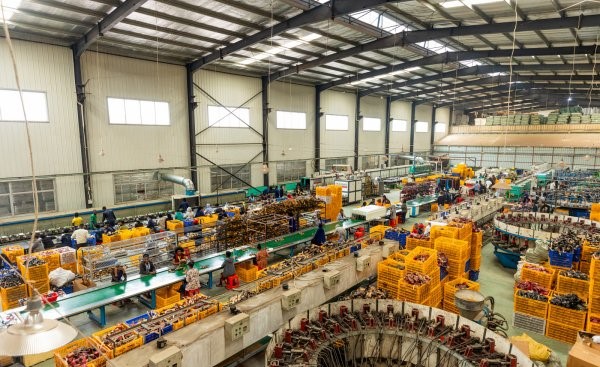Economy
Investigation: Big problems at Landy industries (R) Ltd sexual bribery, bad working conditions, and unfair treatment of workers

At Landy Industries (R) Ltd, a shoe manufacturing company, there are serious allegations of corruption, failure to properly pay employees, embezzlement of taxes and workers’ social security contributions.
While the management denies some of these accusations, they admit that some issues do exist. Rwandanews24 conducted an investigation into these claims, and the findings are detailed in this article.
A Rwandanews24 journalist spent 3 weeks at the company’s entrance, requesting employment and eventually working there for a month to understand the internal operations after hearing about the alleged issues.
This article presents firsthand observations, interviews with some company managers, and information gathered from other sources.
In an interview with Rwandanews24, Mr. Muhirwa, the Operator Manager, stated that the factory began operations in 2017 to address the shortage of shoes made by Rwandans at the time.
The factory produces plastic and rubber shoes and is currently manufacturing closed shoes for men and women.
Regarding the allegations of excessive working hours with workers reportedly starting at 4:45 AM and finishing at 8:00 PM, working 7 days a week without rest Mr. Muhirwa denied the claims, saying they are false.
He said employees work from 7:30 AM to 6:30 PM, with a 30-minute lunch break, and work 6 days a week.
However, analysis shows that while labor standards require a 45-hour workweek, the company makes employees work 60 hours weekly without overtime pay.
According to the journalist’s findings, work starts at 4:30 AM and ends at 8:00 PM, then another shift works from 8:30 PM to 6:30 AM.
Regarding overtime, Mr. Muhirwa said they occasionally work extra hours depending on customer demands.
When asked whether employees truly work overtime every day from Monday to Sunday, sometimes for months and years, he answered that those who work overtime are compensated.
Pressed to show proof of overtime payments, Mr. Muhirwa stayed silent. When reminded again, he only said, “We will check after the interview.”

Guo Jin Lu, owner of Landy Industries (R) Ltd, said that one of the reasons for establishing the factory in Rwanda was because of the country’s security.
The factory also faces complaints of unexplained salary deductions, with notices posted at the company’s entrance explaining deductions: Forgetting a badge: 500 Frw deducted,Being late by one minute after a bathroom break: 1,000 Frw deductedand Missing a day of work: 20,000 Frw deducted.
Over 30 employees have been fired over salary deduction disputes, often finding themselves owing the company rather than the company owing them, forcing them to quit.
Mr. Muhirwa responded, “I don’t entirely agree. In places with many people, misinformation spreads. We can’t penalize a worker for going to the toilet even we do that. We work hard because our machines operate 24/7, so we need strict policies to ensure full attendance.”
Regarding lunch breaks, he said employees are not allowed to leave the premises because the factory has an internal cafeteria.
Although workers are supposed to get a one-hour break, Mr. Muhirwa explained that groups of three go to lunch in shifts, not all at once.

Hu Ting Tina, the wife of the factory owner, co-invested in founding Landy Industries with her husband.
Concerning the firing of employees for being 5 to 25 minutes late returning from lunch, Mr. Muhirwa said: “Employees who feel wronged should come and report to us for help rather than spreading it outside. We have over 2,000 workers; misunderstandings can happen.”
The factory is also accused of not offering long-term contracts. Workers are given three-month contracts and often dismissed afterward, resulting in a constant flow of new job seekers at the factory gate.
Asked about this, Mr. Muhirwa said he was unaware of it. On the constant influx of job seekers, he said, “There’s high unemployment. It’s normal to see people seeking jobs.”
Pressed about why this only happens at their factory and not at neighboring factories (where employees stay for years), he answered, “We’ve had employees since 2017. How could that be if we only hired for three months at a time? I have been here for two years myself.”
The journalist pointed out that administrative employees stay longer, while casual workers are often fired after three months.
Muhirwa replied, “We renew contracts from three months to six months, then to one year.”
Asked to show at least one signed one-year contract, he said, “We have them,” but he didn’t produce any contract for verification.
There are reports of financial and sexual bribery in exchange for jobs at the factory. Notices warning against monetary bribery are prominently posted.
When asked about sexual bribery, Mr. Muhirwa admitted it existed at some point but distanced the management from it, blaming rogue workers.
He said, “Sometimes workers themselves bypass management and demand money from job seekers. That’s why we posted warnings. However, when we investigate and ask victims who took their money, they often can’t identify anyone clearly.”
Although he admitted monetary bribery existed, he was reluctant to talk much about sexual bribery.
The journalist pressed further, sharing evidence from an employee who confessed to having been sexually exploited by a supervisor in exchange for reinstatement after being fired.
Mr. Muhirwa responded, “That’s more than a workplace offense it’s a criminal matter that should be handled by the authorities.”
He denied any knowledge of such acts among current employees and stressed that if anyone was guilty, they should be reported to law enforcement immediately.
When asked whether he had contacted security services for full investigations into sexual bribery, Mr. Muhirwa said they work closely with security daily but then questioned how the journalist could know more than they did.
